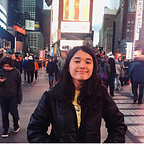Why am I so obsessed with movies?
When people ask me “Where did you grow up?”, I always pause to think about my answer. Technically, I live in Lynwood, California. Pre-COVID, however, I hardly spent any time here. I went to school by the beach, visited my friends in Inglewood, spent Saturdays eating in Downtown, wasted summer days at the California Science Center, and, occasionally, went to family gatherings in the Mid-City/Culver City area. Growing up, traffic-filled freeways were my constant companion as I traveled from one destination to another. Inevitably, my answer to the original question always becomes “Los Angeles” because I feel like I’ve grown up immersed in everything this area has to offer.
Pound, Cath. “The Culture That Defines Los Angeles.” BBC Culture, BBC, 25 Feb. 2020, www.bbc.com/culture/article/20200224-the-culture-that-defines-los-angeles.
Pound’s article emphasizes what Los Angeles looks like as “the entertainment capital of the world.” I felt this article was a good place to start especially because of how Pounds structures it. The purpose of the article is to address reputations and stereotypes about the city through artistic depictions (ie. film, books, and street art). For example, Pound explains the romanticization of L.A. through the film Chinatown (1974). Directed by Roman Polański, the film is set in Los Angeles and heavily features/glamorizes it by filming on-site. By elaborating on ideas using specific works, Pound adopts a form that I am considering emulating in WP 3. This is an article I want to refer to moving forward.
Additionally, the article introduces Los Angeles in a way that aligns with how I see it: big, historic, and idealized. Pound favors films to back up her arguments. This is done with intention. In the introduction, Pound interestingly links L.A. with the film industry by referencing their simultaneous growth. This history has had a heavy influence on how people, especially me, view L.A. Phrases like “Hollywood dream” and “lure of success” give a sense of fantasy associated with L.A. that is a direct result of its story-telling background. Growing up physically surrounded by this history, I was aware of the inseparable nature of the movies and Los Angeles. I mean, you can’t walk down Hollywood Boulevard and NOT feel like you’re a celebrity walking down a red carpet. This association, and love for where I grew up, has undoubtedly inspired a deep connection to all things film.
Chazelle, Damien, director. La La Land. Lionsgate, 2016.
Directed by Damien Chazelle (who won the Academy Award for Best Director), La La Land (2016) is simply beautiful. The movie-musical is about a couple, Mia and Sebastian, who have big L.A. dreams. Mia desperately wants to act, while Sebastian yearns to open his own jazz club. The movie shows us the ups, downs, and evolutions of their relationship as they relentlessly chase their respective dreams. Obviously set in L.A., the movie takes the audience on a detailed tour of the city from Hermosa Beach to the iconic Griffith Observatory. Pound cites Chinatown as a “love letter to Hollywood.” I have nothing against Chinatown, but La La Land tops that title in every way. It is the ultimate love PACKAGE (more than a letter) to Hollywood and Los Angeles. The film is artistically well done. It manages to make places I have known my whole life into a fairy tale. Not only that, but La La Land is a love letter to the art of film as a whole. Visually (choreography, camera angles, costumes), it pays tribute to a vast number of classic Hollywood films such as An American in Paris (1951), West Side Story (1961), Singin’ in the Rain (1952), Funny Face (1957), Broadway Melody of 1940 (1940), etc.
La La Land is an important movie to me because it combines my personal background (living in L.A.) with my current interests (movies). In fact, I credit La La Land with being the movie that inspired my passion for film as a whole. Immediately, I had a deep connection with the movie because it showcased L.A. with so much love and care. Admittedly, I became obsessed with visiting the filming locations of the movie.
Also, La La Land inspired me to watch hundreds of movies I once considered “boring” or simply “old,” but are actually important to understanding film history. After I would drag my family around sights like the Griffith Observatory, I would go home and binge-watch the TCM channel. I fell in love with classics like Bringing Up Baby (1938), Casablanca (1942), and basically all the movies Mia references in La La Land. More than anything, La La Land instilled a fascination with the film industry, especially because it emphasizes the connection to where I grew up (the interconnectedness of film and L.A. was also explored in Pound’s article). My favorite parts of La La Land are the behind-the-scenes features because it truly amazes me how much intention went into creating something so visually breath-taking. Eventually, my fascination for this history of movies grew into an appreciation for the art of filmmaking. Since La La Land, I can’t watch movies passively like I used to. I give every movie I watch my full attention. As a result, movies have been an active part of shaping who I am, my interests, and my many stages of life.
